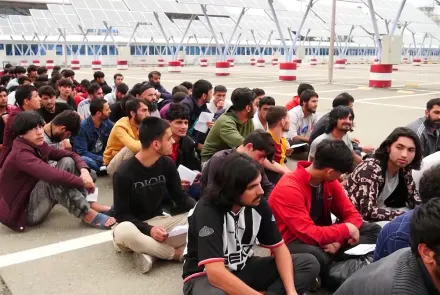Some expelled refugees from Turkiye and Iran complain about the misbehavior of soldiers of these two countries against the citizens of Afghanistan.
They said that Afghan refugees are getting arrested by Turkish and Iranian police and then are beaten and finally deported.
Khair Mohammad, 40, who has been deported three times from Turkiye , said: “I went there to earn something for my family, we were working as guards then the police came and took us. They also beat us.”
Refugees who have recently been deported from Turkiye and Iran have asked the caretaker government to address the challenges of the deported.
“We want the elders of the government to do something for us so that we don’t have to leave the country,” said Taj Mohammad, a deported refugee.
Mohammad, who has been deported from Iran, said: “There are no jobs, the economy is weak so young people leave the country and are persecuted there.”
Meanwhile, the Islamic Emirate criticized the way the host countries deport Afghan refugees and added that the Islamic Emirate has discussed with the authorities of Turkiye, Iran and some other countries preventing the mistreatment of Afghan refugees.
Zabihullah Mujahid, said: “The situation of refugees in both countries, countries where Afghans live, is worrying. But the Islamic Emirate has discussed with the officials of those countries, including Turkiye, to remove the high pressure from refugees.”
This comes as Turkish media has reported the arrest of 76 Afghan refugees at a checkpoint in the central village of Tanriyar of that country.
The past year was tumultuous for the Afghan refugees living in the neighboring countries with hundreds of thousands of them forced to leave their host countries.
The Afghan refugees also faced harassment and mistreatment in countries like Iran, Pakistan and Turkiye. In early October, Pakistan announced a one-month deadline for 1.73 million undocumented Afghan refugees to leave.
Following the deadline, Pakistan’s caretaker government escalated deportation of tens of thousands of Afghans. The Pakistani Interior Minister, Sarfraz Bugti, said in early October: “There are no two opinions that we are attacked from within Afghanistan and Afghan nationals are involved in attacks on us. We have evidence.”
Pakistan’s decision however faced international reactions and many human rights watchdogs including the UN called on Islamabad to reconsider its decision.
“The Pakistani police have mistreated Afghan refugees, and the government has ordered shops to be evacuated and even ordered that homes should not be provided to Afghan migrants,” Hadisa, an Afghan migrant in Pakistan told TOLOnews on October 26.
“Everyone is at home. Even the [refugees] cannot go out to purchase their basic needs including food because if they are detained and deported, it will cause them problems,” Sial Mohammad Wisal, a member of the Afghan refugee’s council, said at the time.
On November 1, 2023, the Islamic Emirate emphasized that the decision of the interim government of Pakistan will damage relations between the two countries.
“The issue of refugees is the issue with which Afghanistan suffers and the people of Afghanistan are suffering, and it also damages the relations between the two countries.
We have asked the government authorities in Pakistan to take the issue seriously and understand the consequences,” Mujahid said.
Despite consecutive calls on Pakistan to stop deporting Afghan refugees, Islamabad escalated its efforts to force undocumented Afghans off of its soil. Over 100,000 Afghan refugees were deported to Afghanistan on November 1, when the deadline expired.
“Around 50 people were going in this truck. It has been hired by 6 families for Rs. 2, 20, 000. We had no time to bargain because the CDA was pushing us,” said Khial Gul, an Afghan refugee, who was quoted by Reuters.
The Islamic Emirate’s Prime Minister, Mullah Mohammad Hassan Akhund, reacted then to the expulsion of Afghan refugees by Pakistan, saying that the action is against international laws.
In a video message, PM Akhund called on Pakistan to not “expel Afghans in an undignified manner, to not harass Afghans and to give them sufficient time so that they can return in a dignified manner.”
In November, the US Department of State’s spokesman, Matthew Miller, in reaction to the forced deportation of Afghans, asked Pakistan to uphold its obligations in the treatment of refugees and respect the principle of non-refoulement.
“So we join all of our partners in urging every state, including Pakistan, to uphold their respective obligations in their treatment of refugees and asylum [seekers], and to respect the principle of non-refoulement. We strongly encourage Afghanistan’s neighbors, including Pakistan, to allow entry for Afghans seeking international protection and to coordinate with international humanitarian organizations to provide humanitarian assistance,” Miller said.—Tolonews










